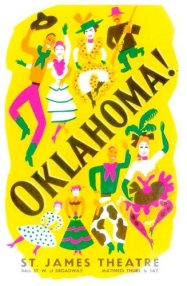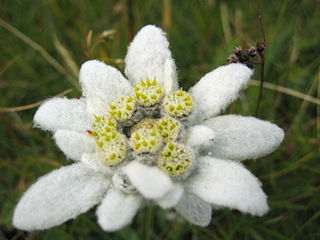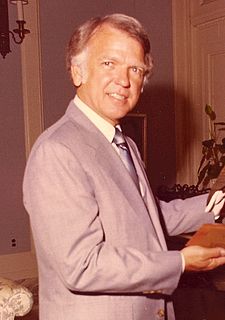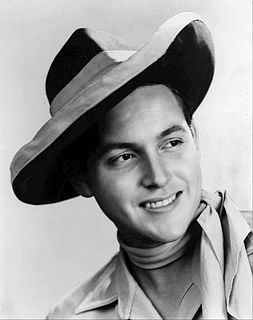Related Research Articles

Jerome David Kern was an American composer of musical theatre and popular music. One of the most important American theatre composers of the early 20th century, he wrote more than 700 songs, used in over 100 stage works, including such classics as "Ol' Man River", "Can't Help Lovin' Dat Man", "A Fine Romance", "Smoke Gets in Your Eyes", "The Song Is You", "All the Things You Are", "The Way You Look Tonight" and "Long Ago ". He collaborated with many of the leading librettists and lyricists of his era, including George Grossmith Jr., Guy Bolton, P. G. Wodehouse, Otto Harbach, Oscar Hammerstein II, Dorothy Fields, Johnny Mercer, Ira Gershwin and Yip Harburg.

Oscar Greeley Clendenning Hammerstein II was an American lyricist, librettist, theatrical producer, and director in the musical theater for almost 40 years. He won eight Tony Awards and two Academy Awards for Best Original Song. Many of his songs are standard repertoire for vocalists and jazz musicians. He co-wrote 850 songs.

Richard Charles Rodgers was an American composer who worked primarily in musical theater. With 43 Broadway musicals and over 900 songs to his credit, Rodgers was one of the most well-known American composers of the 20th century, and his compositions had a significant influence on popular music.

Lorenz Milton Hart was an American lyricist and half of the Broadway songwriting team Rodgers and Hart. Some of his more famous lyrics include "Blue Moon", "The Lady Is a Tramp", "Manhattan", "Bewitched, Bothered and Bewildered", and "My Funny Valentine".

Oklahoma! is the first musical written by the duo of Rodgers and Hammerstein. The musical is based on Lynn Riggs' 1931 play, Green Grow the Lilacs. Set in farm country outside the town of Claremore, Indian Territory, in 1906, it tells the story of farm girl Laurey Williams and her courtship by two rival suitors, cowboy Curly McLain and the sinister and frightening farmhand Jud Fry. A secondary romance concerns cowboy Will Parker and his flirtatious fiancée, Ado Annie.

South Pacific is a musical composed by Richard Rodgers, with lyrics by Oscar Hammerstein II and book by Hammerstein and Joshua Logan. The work premiered in 1949 on Broadway and was an immediate hit, running for 1,925 performances. The plot is based on James A. Michener's Pulitzer Prize–winning 1947 book Tales of the South Pacific and combines elements of several of those stories. Rodgers and Hammerstein believed they could write a musical based on Michener's work that would be financially successful and, at the same time, send a strong progressive message on racism.

Rodgers and Hart were an American songwriting partnership between composer Richard Rodgers (1902–1979) and the lyricist Lorenz Hart (1895–1943). They worked together on 28 stage musicals and more than 500 songs from 1919 until Hart's death in 1943.

Rodgers and Hammerstein was a theatre-writing team of composer Richard Rodgers (1902–1979) and lyricist-dramatist Oscar Hammerstein II (1895–1960), who together created a series of innovative and influential American musicals. Their popular Broadway productions in the 1940s and 1950s initiated what is considered the "golden age" of musical theatre. Five of their Broadway shows, Oklahoma!, Carousel, South Pacific, The King and I and The Sound of Music, were outstanding successes, as was the television broadcast of Cinderella (1957). Of the other four shows that the team produced on Broadway during their lifetimes, Flower Drum Song was well-received, and none was an outright flop. Most of their shows have received frequent revivals around the world, both professional and amateur. Among the many accolades their shows garnered were thirty-four Tony Awards, fifteen Academy Awards, two Pulitzer Prizes and two Grammy Awards.

Sheldon Mayer Harnick is an American lyricist and songwriter best known for his collaborations with composer Jerry Bock on musicals such as Fiorello! and Fiddler on the Roof.

"Edelweiss" is a show tune from the 1959 Rodgers and Hammerstein musical The Sound of Music. It is named after the edelweiss, (Leontopodium nivale), a white flower found high in the Alps. The song was created for the 1959 Broadway production of The Sound of Music, as a song for the character Captain Georg von Trapp. In the musical, Captain von Trapp and his family sing this song during the concert near the end of Act II. It is a statement of Austrian patriotism in the face of the pressure put upon him to join the navy of Nazi Germany following the Anschluss. It is also Captain von Trapp's subliminal goodbye to his beloved homeland, using the flower as a symbol of his loyalty to Austria. In the 1965 film adaptation, the song is also sung by the Captain earlier in the film when he rediscovers music with his children.

George Patterson Nigh is an American politician and civic leader from the U.S. state of Oklahoma. Nigh served as the 17th and the 22nd governor of Oklahoma and as the 8th and 10th lieutenant governor of Oklahoma. He was the first Oklahoma governor to be re-elected and the first to win all 77 counties in the state. Additionally, short term vacancies in the governor's office twice resulted in Nigh assuming gubernatorial duties while serving as lieutenant governor.

Me and Juliet is a musical with music by Richard Rodgers, and lyrics and book by Oscar Hammerstein II. The sixth stage collaboration by Rodgers & Hammerstein, it tells a story of romance backstage at a long-running musical: assistant stage manager Larry woos chorus girl Jeanie behind the back of her electrician boyfriend, Bob. Me and Juliet premiered in 1953 and was considered a modest success — it ran for much of a year on Broadway and had a limited run in Chicago, and returned a small profit to its backers.
"Oh, What a Beautiful Mornin'" is the opening song from the musical Oklahoma!, which premiered on Broadway in 1943. It was written by composer Richard Rodgers and lyricist/librettist Oscar Hammerstein II. The leading male character in Oklahoma!, Curly McLain, sings the song at the beginning of the first scene of the musical. The refrain runs: "Oh, what a beautiful mornin'! / Oh, what a beautiful day! / I've got a beautiful feelin' / Ev'rythin's goin' my way." Curly's "brimming optimism is perfectly captured by Rodgers' ebullient music and Hammerstein's buoyant pastoral lyrics."

Little Mary Sunshine is a musical that parodies old-fashioned operettas and musicals. The book, music, and lyrics are by Rick Besoyan. The original Off-Broadway production premiered November 18, 1959 at the Orpheum Theatre in New York City's East Village. Staying in the neighborhood, it moved to the Player's Theatre on June 21, 1961, then, finally, to the Cherry Lane Theatre on March 21, 1962. Closing was Sept. 2, 1962. Combined run was 1,143 performances. It was seen briefly in a West End production in 1962 and has become a popular show for amateur and semi-professional groups in the United States and elsewhere.

Allegro is a musical by Richard Rodgers (music) and Oscar Hammerstein II, their third collaboration for the stage. Opening on Broadway on October 10, 1947, the musical centers on the life of Joseph Taylor Jr., who follows in the footsteps of his father as a doctor, but is tempted by fortune and fame at a big-city hospital.

Oklahoma! is a 1955 American musical film based on the 1943 musical of the same name by Richard Rodgers and Oscar Hammerstein II, which in turn was based on the 1931 play Green Grow The Lilacs written by Lynn Riggs. It stars Gordon MacRae, Shirley Jones, Rod Steiger, Charlotte Greenwood, Gloria Grahame, Gene Nelson, James Whitmore, and Eddie Albert. The production was the only musical directed by Fred Zinnemann. Oklahoma! was the first feature film photographed in the Todd-AO 70 mm widescreen process.

The 59th Annual Tony Awards ceremony was held on June 5, 2005 at Radio City Music Hall and broadcast by CBS television. Hugh Jackman hosted for the third time in a row.

State Fair is a 1962 American musical film directed by José Ferrer and starring Pat Boone, Bobby Darin, Ann-Margret, Tom Ewell, Pamela Tiffin and Alice Faye. A remake of the 1933 film State Fair and the 1945 film State Fair, it was considered to be a financially and critically unsuccessful film. Richard Rodgers, whose collaborator Oscar Hammerstein had died in 1960, wrote additional songs, both music and lyrics, for this film adaptation of the 1932 novel by Phil Stong.

Green Grow the Lilacs is a 1930 play by Lynn Riggs named for the popular folk song of the same name. It was performed 64 times on Broadway, opening at the Guild Theatre on January 26, 1931, and closing March 21, 1931. It had had an out-of-town tryout, running January 19–24, 1931, at the National Theatre in Washington, D.C. It is the basis of the 1943 musical Oklahoma!, which had a 1955 film adaptation.

Ridgely McClure "Ridge" Bond was an American actor, singer and businessman, who is best known for playing the role of Curly in the musical Oklahoma! on Broadway and on tour. He retired from acting when the musical closed in 1954, and entered the insurance business.
References
- ↑ 25 O.S. § 94.1, Official State Song.
- ↑ "News--East Central University--Ada, Oklahoma". www.ecok.edu. Archived from the original on 2008-02-12.
- 1 2 "Oklahoma Memories: Oklahoma State Song." March 24, 2012. Archived June 29, 2016, at the Wayback Machine Accessed March 18, 2017.
- ↑ Western Writers of America (2010). "The Top 100 Western Songs". American Cowboy. Archived from the original on 19 October 2010.